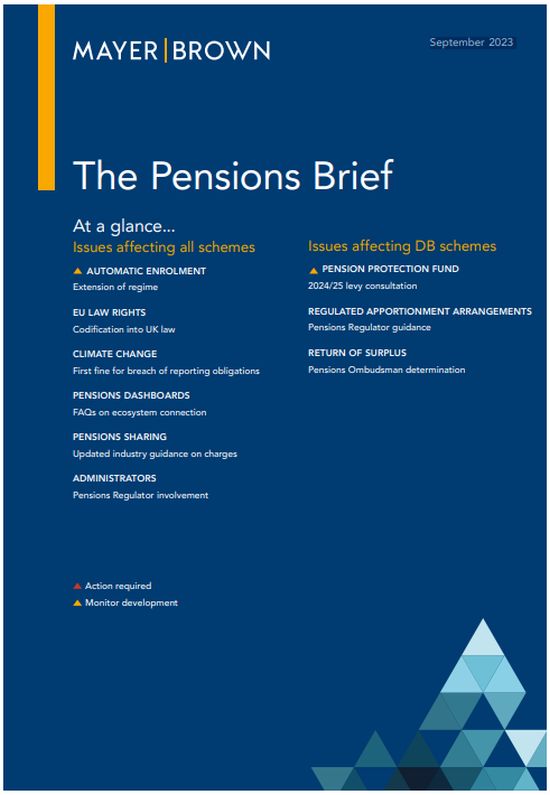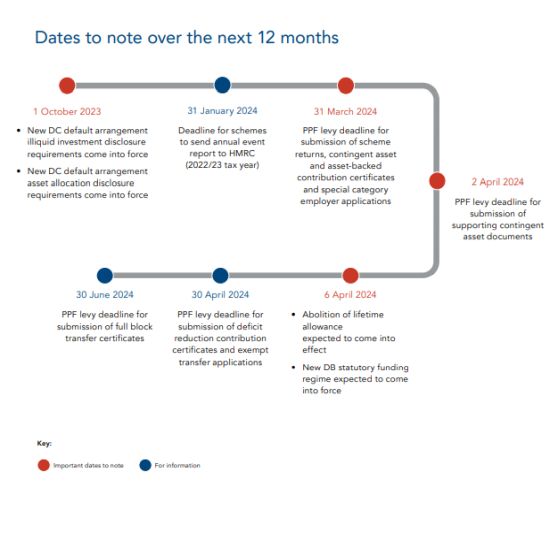

Issues affecting all schemes
Automatic enrolment – extension of regime
The Pensions (Extension of Automatic Enrolment) Act 2023 has now received Royal Assent. It gives the government the power to make regulations:
- Reducing the age at which workers become eligible for automatic enrolment.
- Reducing or removing the lower qualifying earnings limit.
This regulation-making power will come into force on a day to be appointed by statutory instrument.
Action
Employers, trustees and administrators should monitor the government's exercise of this regulation-making power.
EU law rights – codification into UK law
Two sets of regulations have been laid before Parliament for approval which codify into UK law certain EU law rights decided in various court decisions. The first set of regulations:
- Remove the requirement for an actual opposite sex comparator to establish whether there is discrimination caused by the GMP legislation for post-May 1990 service (in relation to both benefits provided under an occupational pension scheme and Pension Protection Fund (PPF) compensation).
- Requiring schemes to pay equal survivors' benefits to spouses and civil partners regardless of whether they are opposite or same sex.
The second set of regulations:
- Require the PPF compensation payable to a person to be at least 50% of the value of the benefits that the person would have been entitled to under the rules of the original scheme. This applies for assessment dates on or after 1 January 2024.
- Remove the PPF compensation cap for assessment dates on or after 1 January 2024.
Once approved, the regulations will come into force immediately before the end of 2023. Currently the EU law rights decided in the various court decisions form part of "retained EU law" by virtue of the European Union (Withdrawal) Act 2018. However, under the Retained EU Law (Revocation and Reform) Act 2023, these retained EU law rights will cease to apply after 31 December 2023 unless codified into UK law.
Action
No action required.
Climate change – first fine for breach of reporting obligations
The Pensions Regulator (TPR) has announced that it has issued the first fine for failure to comply with the climate change reporting obligations. The trustee of a scheme which was subject to the requirements had produced its climate change report and the scheme administrator had sought to publish it online by the statutory deadline of 31 July 2022. However, the website URL was faulty and the report was not in fact accessible online. After TPR contacted the trustee, the report was correctly published on 10 August 2022.
TPR issued a fine of £5,000 which the trustee has paid. In line with its monetary penalties policy, TPR issued a fine above the statutory minimum (£2,500) because the trustee was a corporate body and to reflect the nature of the breach.
Action
No action required, but trustees who are subject to the climate change reporting obligations may wish to confirm that their climate change report has been published online and that the website URL is functional. This decision also indicates that TPR is likely to take a relatively stringent approach to enforcement of the reporting obligations generally and trustees may wish to bear this in mind when preparing their climate change reports.
Pensions dashboards – connection options
The Pensions Dashboard Programme has published FAQs on the different options for connection to the dashboards ecosystem. The FAQs cover:
- The different options for connection.
- How to decide the right approach.
- Who is responsible for ensuring the scheme connects on time.
Action
No action required, but trustees and administrators may find the guidance helpful in their dashboards preparation.
Pension sharing – updated guidance on charges
The Pensions and Lifetime Savings Association has updated its guidance on pension sharing on divorce. The guidance is designed to support private sector schemes when providing information for pension sharing orders. It includes a recommended range of charges as well as a flowchart outlining the circumstances in which charges can be made.
Action
No action required, but trustees and administrators may find the guidance helpful when levying charges in connection with pension sharing.
Administrators – Pensions Regulator involvement
The Pensions Regulator (TPR) has published a blog post on how it is changing its regulatory approach to work more closely with administrators. TPR believes that good quality data is the foundation of a well-run scheme and administrators are integral to ensuring this. In January 2022, TPR created an Administrator Relationships function, a team dedicated to engaging directly with third party administrators on a voluntary basis which is currently focusing on the following areas:
- Systems and processes.
- Data quality.
- Trustee focus on and understanding of the importance of administration.
- Member engagement and communication.
- Pensions dashboard readiness.
Action
No action required
To view the full article click here
Originally Published by September 2023
Visit us at mayerbrown.com
Mayer Brown is a global services provider comprising associated legal practices that are separate entities, including Mayer Brown LLP (Illinois, USA), Mayer Brown International LLP (England & Wales), Mayer Brown (a Hong Kong partnership) and Tauil & Chequer Advogados (a Brazilian law partnership) and non-legal service providers, which provide consultancy services (collectively, the "Mayer Brown Practices"). The Mayer Brown Practices are established in various jurisdictions and may be a legal person or a partnership. PK Wong & Nair LLC ("PKWN") is the constituent Singapore law practice of our licensed joint law venture in Singapore, Mayer Brown PK Wong & Nair Pte. Ltd. Details of the individual Mayer Brown Practices and PKWN can be found in the Legal Notices section of our website. "Mayer Brown" and the Mayer Brown logo are the trademarks of Mayer Brown.
© Copyright 2023. The Mayer Brown Practices. All rights reserved.
This Mayer Brown article provides information and comments on legal issues and developments of interest. The foregoing is not a comprehensive treatment of the subject matter covered and is not intended to provide legal advice. Readers should seek specific legal advice before taking any action with respect to the matters discussed herein.

